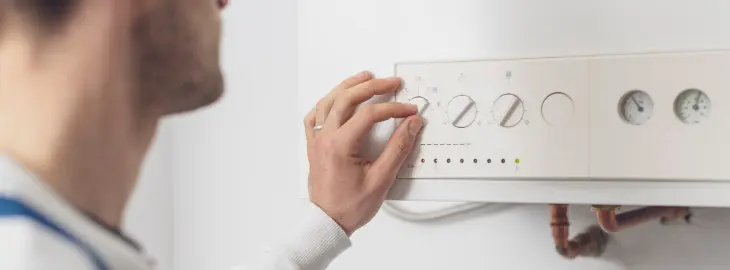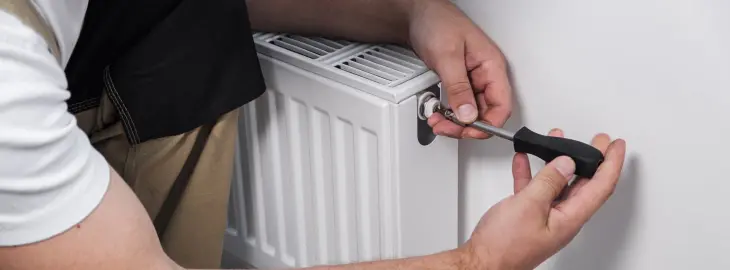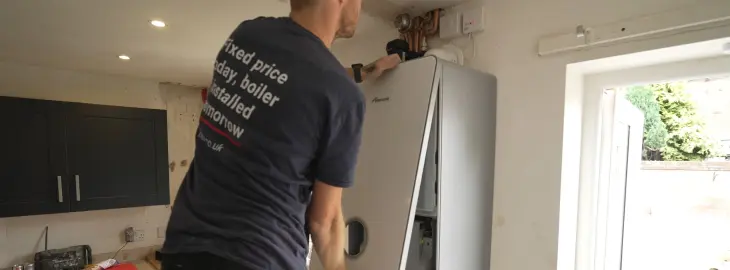

Written by Stephen Day
Gas Safe Engineer
Updated: 12th December, 2025
The Vaillant F22 fault means your boiler pressure is too low and needs topping up.
Get a new boiler quote, save up to £550 per year (0% APR available).
F22 is a safety lockout used on many Vaillant boilers.
It appears when the boiler detects that the water pressure has dropped below the safe working level.
A modern sealed central heating system needs enough water to circulate through radiators and internal components.
If the pressure falls too low, the boiler cannot move the water effectively, and it shuts down to prevent overheating or damage.
Most F22 callouts we see at iHeat are linked to slow pressure loss over time, air entering the system after radiator bleeding or a component such as the pressure sensor or expansion vessel not holding the correct level of charge.
When the system is cold, most Vaillant boilers sit comfortably around 1.0 to 1.2 bar.
Once the heating switches on, the pressure rises naturally to somewhere between 1.5 and 1.8 bar. This is normal.
F22 usually appears when cold pressure falls below 0.7 bar.
If the pressure rises above 2.5 bar when the system is hot, this can point towards an expansion vessel issue or a pressure relief valve that has been forced open.

This is the primary trigger. If the boiler does not have enough water in the system, the internal pump cannot circulate it properly, and the boiler locks out.
If your boiler pressure is consistently low, it’s important to know how to fix it safely. To learn more about how to top up your boiler pressure effectively, check out our guide on how to fix low boiler pressure.

Many leaks are slow and hard to spot. They commonly appear around radiator valves, towel rails, pipe joints and underfloor heating manifolds.
Even a slight seep can drop the pressure over several days.
Because these pipes heat up, the moisture often evaporates before it becomes visible.

Bleeding radiators releases trapped air, but it also lowers the system water volume. If the system is not topped up afterwards, F22 is likely to appear.

If the pressure sensor begins to misread the system pressure, the boiler may display F22 even when the pressure is correct.
This is less frequent but still a recognised cause.

The expansion vessel manages pressure changes as water heats and cools.
If it loses its internal air charge, the pressure can rise too quickly while the system is hot and then drop sharply when it cools, leading to repeated F22 faults.

If the system has previously been overfilled, the relief valve may have opened to release excess pressure.
Once this happens, some valves do not fully reseal and can allow slow, continuous pressure loss.
Look at the pressure gauge on the front of the boiler. If it reads below 1.0 bar, the system needs topping up.
Open the filling loop valves gradually until the pressure rises to about 1.2 bar while the system is cold.
Increase the pressure slowly so you do not overshoot. When the pressure reaches the correct level, close both valves.
Most Vaillant models will clear the fault and restart automatically once pressure is restored.
If not, press the reset button in line with the user manual.
A healthy system should hold pressure for long periods.
If the pressure drops again within a few days, the boiler is losing water, or a component needs attention.
Do not remove the boiler casing, keep topping up the boiler every couple of days, or continue using the heating if the pressure keeps falling.
Do not ignore water marks around radiators or pipe joints, and do not attempt to work on internal boiler components without a Gas Safe qualification.
An engineer should inspect the system if the pressure drops repeatedly, if radiators fill with air soon after being bled, if the boiler pressure rises too high when the heating runs, if tapping or gurgling noises appear or if the boiler shows F22 again shortly after a reset.
In most repeat cases, the cause is a failing expansion vessel, a passing pressure relief valve, a pressure sensor fault or a hidden leak somewhere in the heating system.
These require proper diagnosis and should not be repaired by a homeowner.
A Gas Safe engineer will test the system pressure when cold and hot, check the expansion vessel charge, inspect the pressure relief valve, look for hidden leaks around the system and test the pressure sensor and wiring.
They will also check that the filling loop is not letting water by.
This ensures the root cause is found and corrected.
Symptom | Likely Cause | Next Step |
|---|---|---|
Pressure falls slowly over a few days | Minor leak or passing valve | Engineer inspection |
Pressure drops immediately | Significant leak or filling loop fault | Engineer required |
Pressure rises too high when hot | Expansion vessel issue | Vessel recharge or replacement |
F22 after bleeding radiators | Low pressure | Top up to 1.2 bar |
F22 persists after topping up | Faulty sensor or vessel | Engineer diagnosis |
Check your boiler pressure monthly, top up after bleeding radiators, book an annual boiler service and keep an eye out for any damp patches or dry white deposits on pipe joints, which can show early signs of a leak.
Good system maintenance reduces the chance of pressure-related faults.
iHeat engineers diagnose and fix Vaillant pressure faults daily.
If topping up the boiler did not resolve the F22 code or if the pressure continues to fall, a professional inspection is the safest option.
Our Gas Safe engineers can identify the underlying cause and restore safe, reliable heating.
Last updated: 12th December, 2025

Written by Stephen Day
Gas Safe Engineer at iHeat
Stephen Day is a Gas Safe registered and FGAS certified engineer with over 20 years of hands-on experience in the heating, cooling, and renewable energy industry, specialising in boiler installations, air conditioning, and heat pump systems.
LinkedInArticles by Stephen Day are reviewed by iHeat’s technical team to ensure accuracy and reliability.

13th February, 2026
Boiler energy efficiency refers to how well a boiler uses its fuel to generate heat. This...
 Read Article
Read Article

12th February, 2026
This Valentine’s Day we want to let you in on a dirty little secret…
 Read Article
Read Article

12th February, 2026
In this guide, we’ll be answering some of the most frequently asked questions about what h...
 Read Article
Read Article
No obligation. Takes less than 60 seconds.